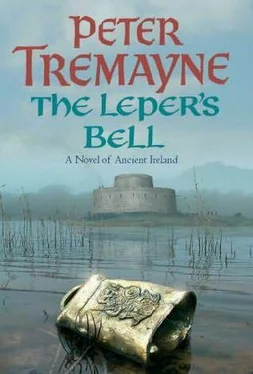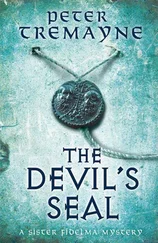Peter Tremayne - The Leper's bell
Здесь есть возможность читать онлайн «Peter Tremayne - The Leper's bell» весь текст электронной книги совершенно бесплатно (целиком полную версию без сокращений). В некоторых случаях можно слушать аудио, скачать через торрент в формате fb2 и присутствует краткое содержание. Жанр: Исторический детектив, на чешском языке. Описание произведения, (предисловие) а так же отзывы посетителей доступны на портале библиотеки ЛибКат.
- Название:The Leper's bell
- Автор:
- Жанр:
- Год:неизвестен
- ISBN:нет данных
- Рейтинг книги:4 / 5. Голосов: 1
-
Избранное:Добавить в избранное
- Отзывы:
-
Ваша оценка:
- 80
- 1
- 2
- 3
- 4
- 5
The Leper's bell: краткое содержание, описание и аннотация
Предлагаем к чтению аннотацию, описание, краткое содержание или предисловие (зависит от того, что написал сам автор книги «The Leper's bell»). Если вы не нашли необходимую информацию о книге — напишите в комментариях, мы постараемся отыскать её.
The Leper's bell — читать онлайн бесплатно полную книгу (весь текст) целиком
Ниже представлен текст книги, разбитый по страницам. Система сохранения места последней прочитанной страницы, позволяет с удобством читать онлайн бесплатно книгу «The Leper's bell», без необходимости каждый раз заново искать на чём Вы остановились. Поставьте закладку, и сможете в любой момент перейти на страницу, на которой закончили чтение.
Интервал:
Закладка:
Gorman put his head round the inn door without observing the newcomer.
‘The horses are ready, lady.’
Fidelma paused a moment and then smiled at the former warrior.
‘I am grateful for this information, Cathalán. Do not think that I am not. It may or may not be of relevance. Probably not. But all information is of help.’ She turned back to Aona. ‘Once more we are indebted for your welcome hospitality, Aona.’ She pressed some coins into his reluctant hand.
‘I am always pleased to serve you, lady.’ The old innkeeper smiled. ‘There is no person in this kingdom, having heard of your plight, who does not wish you success in tracking down the culprit.’
Eadulf pursed his lips cynically. ‘Surely one would have to accept there must be at least one person in this kingdom who does not, Aona,’ he said dryly as he turned and followed Fidelma from the inn. It took Aona a moment or two before he understood what Eadulf meant, by which time the door had closed behind him.
Within a short time they were following the north bank of the River Ara while, to the south, the long wooded ridge of Slievenamuck stood framed against the lighter sky. The heavy storm clouds had passed over to the east and it looked as though the late afternoon was going to be fine. The sun was in the western sky but not low as yet. Eadulf was trying to remember the name of the hills to the north of them, some miles distant. Fidelma had told him when they had first made their journey along this road.
Fidelma, as though she had read his thoughts, at that moment leant over and touched him on the arm.
‘The Slieve Felim mountains,’ she said, pointing. ‘Beyond those are the lands of the Uí Fidgente. Not a place to go wandering without protection.’
When they emerged from the woodland and into an open hilly area, Eadulf recognised his surroundings immediately.
Imleach Iubhair: ‘the borderland of yew trees’. The great stone walls surrounded the abbey of St Ailbe, who had first preached Christianity in Muman. They dominated the little township that stretched before them. He found it hard to accept that it was here that he and Fidelma had nearly lost their lives. He felt very much at home as he looked on the stretches of grazing land, edged with forests of yew trees, tall and round-headed.
The first time he had seen Imleach it was deserted, but now the market place, directly in front of the abbey, was bustling. People were thronging the stalls and pens in which cattle patiently stood waiting to be sold, and goats, pigs and sheep moved impatiently in their confines. Traders were shouting their wares; cheesemakers, blacksmiths, bakers and a hundred and one others trying to attract customers.
‘Not like the last time I came here,’ Eadulf remarked humorously.
‘Life has returned to normal,’ observed Fidelma shortly as she led the way through the market square towards the sad-looking, burnt-out remains of a massive yew tree that had once dominated even the great walls of the abbey. Once it had risen nearly twenty-two metres in height. Fidelma, with Capa and the other warriors, halted her horse before it and bowed her head. Eadulf remembered that this was once the sacred totem of the Eóghanacht, their ‘Tree of Life’, which was said to have been planted by the hand of Eibhear Foinn, son of Milidh, from whom the Eóghanacht claimed to have descended. Eadulf remembered the time when the enemies of the Eóghanacht had attacked and tried to destroy it. He and Fidelma had been sheltering in the abbey and impotent to halt the destruction. Yet halted it had been.
‘In spite of our enemies,’ Gorman smiled proudly, pointing to some green shoots on some of the higher branches, ‘our tree still thrives.’
Eadulf was surprised that the ancient tree was still living. It remained the symbol of Eóghanacht power. It was an ancient belief that the tree was a symbol of the vitality of the Eóghanacht dynasty and if the tree flourished, they flourished. If it were destroyed … then the dynasty would fall and be no more. But the dynasty, like the tree, had survived; survived, if the ancient bards were to be trusted, for fifty-nine generations since Eibhear Foinn established it.
They turned from the tree and moved on to the abbey. The gatekeeper had already spotted their approach and the great oak doors stood open. A familiar figure stood ready to receive them. It was Brother Madagan, the rechtaire or steward of the abbey.
Chapter Five
They sat in Brother Madagan’s chamber, from where the steward administered the great abbey of Imleach. As rechtaire , he assumed control in the absence of Bishop Ségdae, who was not only bishop but also abbot of Imleach. The mood was sombre. Brother Madagan had sat silently while Fidelma had explained the reason for their visit to the abbey. During the course of her explanation he continually raised a hand to finger the scar on his forehead. Both Fidelma and Eadulf knew well how he had received the wound during the attack on Imleach.
When Fidelma had finished telling Brother Madagan what had brought them to the abbey again, they sat sombrely in front of the crackling fire. The steward was filled with concern at the news and offered to give what help he could. Fidelma had told him about the pilgrims and the other travellers who had passed through Cashel.
‘So you are wishing to question the pilgrims who have come to pray in the chapel of the Blessed Ailbe?’
‘I am indeed,’ Fidelma affirmed. ‘I hope they are still here?’
Brother Madagan nodded. ‘But the others you mentioned … Brother Tanaide, and the stranger from beyond the seas, are no longer here. They have already continued their journey westward after one night of hospitality.’
‘Who is Brother Tanaide?’ asked Eadulf.
‘The young monk who was guide and interpreter for the stranger from Persia.’
‘What did this stranger from Persia want here?’
‘He calls himself Brother Basil Nestorios and speaks Greek and Latin as well as his native tongue. He has a lively discourse and spoke much about his homeland and beliefs. I felt sad that he could only spend a night here before travelling on to the abbey of Coimán. You surely don’t need to speak to them?’ Brother Madagan hesitated and then shook his head. ‘I am sure that neither of these brothers of the Faith could have had anything to do with the matter that brings you hither.’
Fidelma smiled tiredly. ‘I am sure you are right. It is merely a matter of questioning to hear if they observed anything that might help us. What may be seen and discarded as unimportant by a bystander, when collected, like a piece of a puzzle, and compared to other accounts might create a complete picture.’
‘Where is this abbey of Coimán?’ asked Eadulf.
To the west, standing by the sea at the mouth of the River Maighin, the river of the plain,’ explained the steward. ‘It is at least one day’s journey from here if one rode a fast horse.’
‘It stands at the beginning of the lands of the Corco Duibhne, the land of Duibhne’s people,’ added Fidelma. ‘To get there it means crossing Uí Fidgente territory.’
‘Are the Corco Duibhne part of your brother’s kingdom?’
‘Their sub-king Slébéne pays tribute to Cashel. However, they are a fierce and independent people who still claim a pagan goddess named Duinech as their foster-mother. She was said to have regenerated herself into seven periods of youth so that she became mother to the widely scattered tribes of the Múscraige. The abbey of Coimán lies on the edge of his territory, which is guarded by a vicious Uí Fidgente warlord who, so reports tell us, claims to be lord of the passes through the mountains there. I, for one, would prefer to avoid Slébéne’s petty kingdom.’
Читать дальшеИнтервал:
Закладка:
Похожие книги на «The Leper's bell»
Представляем Вашему вниманию похожие книги на «The Leper's bell» списком для выбора. Мы отобрали схожую по названию и смыслу литературу в надежде предоставить читателям больше вариантов отыскать новые, интересные, ещё непрочитанные произведения.
Обсуждение, отзывы о книге «The Leper's bell» и просто собственные мнения читателей. Оставьте ваши комментарии, напишите, что Вы думаете о произведении, его смысле или главных героях. Укажите что конкретно понравилось, а что нет, и почему Вы так считаете.











